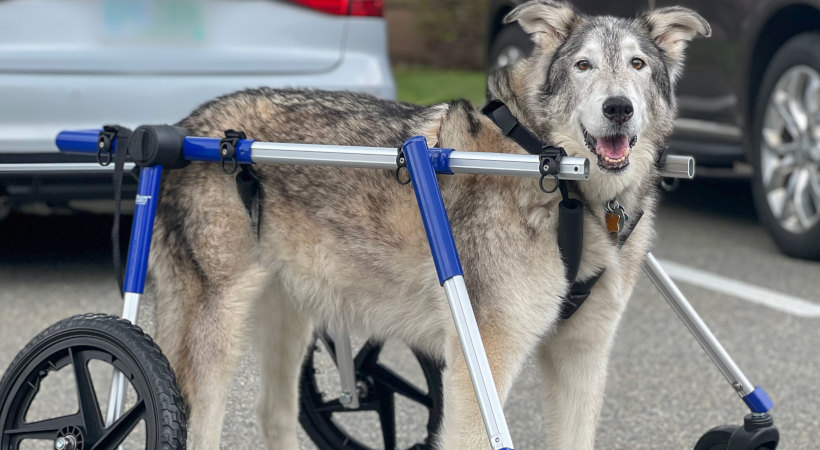- November 29, 2023
Degenerative Myelopathy and Dog Wheelchairs

A dog wheelchair plays a pivotal role in a dog’s degenerative myelopathy journey. Degenerative Myelopathy (DM) is a progressive neurological disease that takes its toll on a dog’s mobility. As DM progresses, a dog’s back legs will slowly weaken before the hind legs become fully paralyzed. Eventually, the mobility loss progresses up a dog’s spine to impact its front leg strength as well. A wheelchair is vital for a dog with Degenerative Myelopathy. Without a wheelchair, a DM dog is unable to walk, stand, or get any exercise.
When is the right time to get a cart for my DM dog?

A dog wheelchair is a life-changing tool for dogs with DM. The earliest signs of degenerative myelopathy start out small. One of the first indicators of DM is knuckling, or dragging the back paws. This can be combined with hind leg weakness and signs that the dog’s back legs are losing strength.
Although these early DM symptoms can be easy to miss. As they may only happen occasionally or only when a dog is exhausted. However, when a dog’s back legs collapse underneath them or a dog struggles to push up off the ground, the signs become much harder to ignore.
There is no need for your dog to struggle with mobility loss, so don’t wait to get a mobility cart for your dog. Instead, introduce a mobility cart early at the first signs of weakening back legs. Not only does this make for an easier transition for your dog, but it also gives the pet parent a chance to adjust to using the wheelchair, too! Every dog diagnosed with degenerative myelopathy will need a wheelchair eventually. So, starting early in a dog’s diagnosis will be easier for you and your best friend.

What kind of wheelchair should I get for a dog with Degenerative Myelopathy?
The ideal degenerative myelopathy wheelchair for your pet is a cart that can be adapted to fit every stage of your dog’s diagnosis. The only certainty with DM is that it will progressively worsen and your dog’s mobility needs will change. As the disease progresses, you need a wheelchair that will progress with it. The Walkin’ Wheels dog wheelchair can easily convert from a rear support wheelchair to a four-wheeled wheelchair by simply adding a front attachment. This gives you the flexibility to adjust the level of support your dog needs as their leg strength changes. An adjustable wheelchair means you can start by supporting your pet with a rear wheelchair, and convert their existing cart until a full support wheelchair when additional support is needed across all four legs.

Choose a fully adjustable dog wheelchair that allows you to adjust the height, length, and, most importantly, the width of the wheelchair. An adjustable width means that your dog’s wheelchair will always fit, even if your dog loses muscle mass or weight over time. Muscle atrophy is quite common in dogs with DM so expect your dog’s body shape to change.
Custom-built dog wheelchairs are made based on your dog’s measurements the day you place the order. If your dog’s weight fluctuates, the custom cart may no longer fit your dog comfortably. Also, a custom rear dog wheelchair will not convert into a quad cart when your dog’s front legs weaken. When your dog requires additional assistance with its front legs, it will likely need a whole new wheelchair.
DM Dog Learns to Walk Again
“Rosie was diagnosed with Degenerative Myelopathy. Over the last year, she has lost most of her strength in her back legs. Rosie got her life back when she got her Walkin’ Wheels. She now chases her laser pointer around a nearby field for hours every night, only to come back inside with bribes. Just watch your toes, she isn’t slowing down for anyone!”
– Nora and Kyle

Is exercise beneficial for dogs with DM?
A dog in motion stays in motion. Therefore, continued exercise and regular activity are vital for any dog, even those struggling with mobility loss. A recent study showed that regular exercise could improve a DM dog’s quality of life and life expectancy. In fact, continued structured exercise may even slow down the progression of the disease!
Dog wheelchairs are crucial to helping dogs with Degenerative Myelopathy to stand upright, walk normally, and stay active.
Related Articles:
Tags
What do you think?
Related Articles

New Puppy Checklist: Gear You’ll Need for Your New Dog
Getting a new puppy is really exciting, but before you welcome them home, it’s important to prepare your space for them. Since puppies need a

How Big Do Mini Poodles Get? Vet Reviewed Average Weight & Growth Chart – Dogster
The information is current and up-to-date in accordance with the latest veterinarian research. Learn more » When you buy a Miniature Poodle, you might not

Can Police Dogs Smell Nicotine? Vet Verified Facts & Info – Dogster
The information is current and up-to-date in accordance with the latest veterinarian research. Learn more » While cigarette sales have been declining steadily for decades,

How Old Is 5 in Dog Years? Vet-Approved Guide to Each Size of Dog – Dogster
The information is current and up-to-date in accordance with the latest veterinarian research. Learn more » A common method for calculating a dog’s age is

